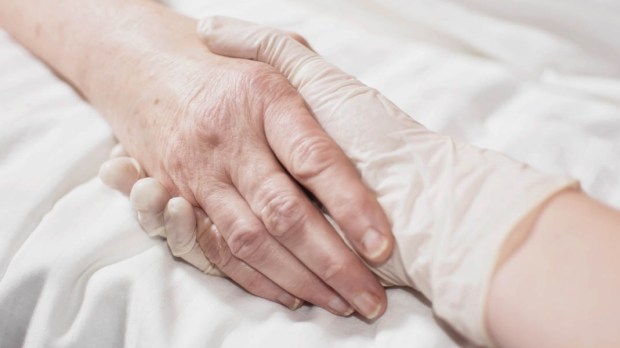Lenten Campaign 2025
This content is free of charge, as are all our articles.
Support us with a donation that is tax-deductible and enable us to continue to reach millions of readers.
If the coronavirus has one lasting lesson, it is that society values the life of each individual, regardless of one’s age or medical condition, said a bishop in Great Britain. That is evident by the work and sacrifices made to protect the most clinically vulnerable members of society.
But a bill making its way through the House of Lords suggests otherwise, Bishop Patrick McKinney of Nottingham said.
The Assisted Dying Bill, which could be debated in the House of Lords this fall, sends the message “that some lives are no longer worth fighting for,” Bishop McKinney said.
The proposal, put forward by Baroness Molly Meacher, would allow terminally ill patients in their last six months of life to end their own lives with the permission of two doctors and a judge. Bishop McKinney asked Catholics to “send the message that a prescription for lethal drugs is not the civilized solution for vulnerable people seeking a dignified and peaceful end.”
Baroness Meacher’s bill would allow physician-assisted suicide for terminally-ill adults with less than six months to live.
Britain’s current prohibition against the practice “sends a clear message,” the bishop said in a video message to his flock: “We do not involve ourselves in bringing about the death of another person, no matter how ill or depressed they might feel. This is the surest way to protect those who are nearing the end of their lives from abuse, coercion or, indeed, internal pressure to choose assisted death out of fear of burdening their loved ones.”
He added that under current law and practices, “doctors have a duty of care to do everything in their power to make death a peaceful and dignified experience. To offer patients in despair a lethal prescription instead, would represent a disturbing shift in our culture of care.”
Canadian example
Pointing to Canada’s evolving laws regarding assisted suicide, the bishop warned of a slippery slope if Meacher’s bill becomes law. “If the purpose of assisted dying is to alleviate suffering, then why should it be limited to the terminally-ill with only six months to live?” McKinney reasoned. “Campaigners will inevitably argue that it should also be allowed for those who have years of suffering ahead of them, due to chronic illness or disability. Canada’s experience is just one example of how quickly an assisted dying law, with supposed safeguards, can expand far beyond those who are terminally-ill.”
In 2016, Canada legalized what it calls medical aid in dying (MAiD), permitting euthanasia and physician-assisted suicide. The law allows assisted suicide when death is “reasonably foreseeable,” in the wording of the legislation. Earlier this year, following a 2019 court ruling, MAiD was expanded to persons who are not facing imminent death. In March 2023, the MAiD law will permit life-ending injections for the mentally ill.
Bishop McKinney encouraged members of his diocese to sign up for a Zoom talk, “Assisted Dying: A win for personal autonomy or a loss for civil society?” to be hosted by the Nottingham Diocese on September 9th at 7:30 pm London time. It will be delivered by a former paralympian who is now a member of the House of Lords, Baroness Grey-Thompson.
“The Baroness will discuss the flaws within the Meacher Bill and the worrying lack of safeguards,” the bishop said. “We are extremely privileged to have such insights from someone who has courageously fought disability discrimination, and who recognizes so clearly the ramifications of the Meacher Bill for both disabled people and our wider society.”



